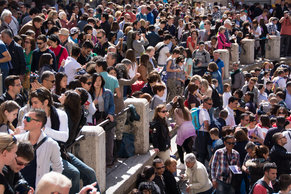
Identity
Where there is social cohesion, people strongly identify with the group membership.Trust
Social cohesion can be measured by asking people to what degree they trust and identify with their nation, city, family or other social group.Individualism & Freedom
Social cohesion is associated with collectivism whereby groups are willing to sacrifice for the good of the whole. This typically runs in opposition to individualism whereby people seek freedom from the group.Small Groups
Social cohesion tends to be stronger in small groups, such as a family or sports team. This is based on personal relationships, shared experiences and emotional bonding such that it is dissimilar from social cohesion at scale.Strong State
At the national level, social cohesion allows a state to control many aspects of life as people will be more likely to trust the state and identify with common goals. This can take many forms such as a paternalistic state that controls for security, safety and health or an industrial state that closely supports large firms and industries. Likewise, expansionist imperialist states such as the British Empire or Imperial Japan demonstrated high social cohesion.Conformity
Social cohesion allows for high conformity whereby people trust the group and are generally willing to conform to rules and norms imposed by or expected by the group.Civility
Civility runs high in an environment of social cohesion. People will try to resolve differences and conflict using the prescribed methods of the group.Social Exclusion
As people strongly identify with the group, social exclusion is perceived as tragic. Groups with high social cohesion are less likely to exclude members but exclusion is more serious. In many cases, a group with high social cohesion take an us versus them view of other groups and may strongly exclude "them."Collectivism
A willingness to prioritize common goals over individual goals. For example, a willingness to support a high tax regime that supports extensive social programs and infrastructure.Social Loafing
As social exclusion is unlikely, social loafing may occur. For example, Japanese firms traditionally offer lifetime employment whereby employees are unlikely to be let go with promotions mostly based on seniority. This creates an environment where low performance isn't strongly punished and high performance isn't strongly rewarded.Alienation
In an environment where most people are committed to conformity to the group, those who don't feel the same way are likely to feel a harsh sense of alienation.Group Harmony
Groups with high social cohesion may prioritize group harmony whereby getting along is more important than other goals such as revenue or quality of life. For example, a firm where managers must always win consensus or unanimous decisions from their team such that teams enjoy group harmony but strategy is likely to defend the status quo.Fairness
Social cohesion will tend towards equality whereby people in the group expect similar outcomes in life. The group may not strongly penalize misbehavior that is perceived as cooperative such as cronyism but will strongly penalize misbehavior that is perceived as individualistic.Shared Experiences
The pursuit of shared experiences builds social cohesion and benefits from it. For example, a nation with a strong sense of shared symbols, holidays, pastimes, traditions, lifestyle and so forth.Inclusiveness
Social cohesion is typically based on a sense of shared identity, values, goals, sensibilities and purpose. However, these shared values may include things such as tolerance, freedom, individualism and inclusiveness whereby to be part of the group is to be a free and unique individual. This has interesting dimensions that may address some of the potential issues with social cohesiveness such as rigid conformity to an identity of sameness.Development
The concept of social cohesion may be very different when speaking of developing nations versus developed nations with advanced economies. Social cohesion is critical for building the systems, institutions, infrastructure and economic cooperation required for economic and social development. In advanced economies, it may be possible to challenge the role of social cohesion where it has arguably gone too far such as an environment of groupthink and conformity where creativity, freedom and individualism are suppressed.Notes
In some cases, the term social cohesion is used to represent a particular ideology or policy that doesn't necessarily map to the descriptions above. For example, it may be used as a synonym of collectivism.| Overview: Social Cohesion | ||
Type | ||
Definition | The degree to which a social group trust each other and commit to shared goals, norms and experiences. | |
Related Concepts | ||
































